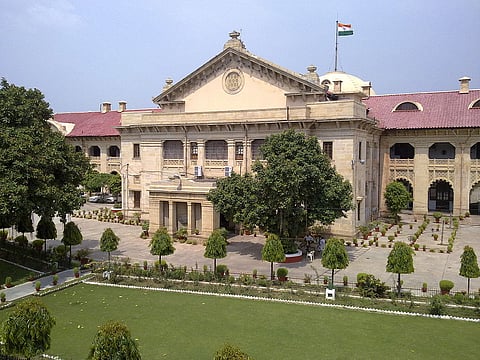

A single-judge bench of Allahabad High Court observed in an order last month that conversion from one religion to another should be independent of fear and greed. Not only is the contrary unlawful, but it also damages the structure of the country which in turn, benefits destructive powers, writes ABHISHEK ANAND.
———-
IN a recent ruling, the Allahabad High Court observed that religion is an object of devotion that should not be attached to any particular system, and that Emperor Akbar and his wife Jodha Bai are a good example of the same. The single-judge bench of Justice Shekhar Kumar Yadav made this observation in an order last month while refusing to give bail to one Javed of Etah district, who was accused of unlawfully converting a Hindu girl to Islam for the purpose of getting married to the victim. Javed has been accused under Sections 120-B, 366, and 368 of the Indian Penal Code, and Section 5 (1) of the Uttar Pradesh Prohibition of Unlawful conversion of Religion Act, 2020.
Justice Yadav further clarified that while Article 25(1) of the Indian Constitution guarantees the freedom of religion and states that any citizen of the country is free to convert their religion and marry any adult, this does not mean that any person can be converted out of fear or greed.
Referring to the Supreme Court's landmark judgment in the case of Rev. Stanislaus vs. State of Madhya Pradesh & Ors. (1977), the High Court quoted the following extract from the judgment:
"It has to be remembered that Article 25 (1) guarantees "freedom of conscience" to every citizen, and not merely to the followers of one particular religion, and that, in turn, postulates that there is no fundamental right to convert another person to one's own religion because if a person purposely undertakes the conversion of another person to his religion, as distinguished from his effort to transmit or spread the tenets of his religion, that would impinge on the "freedom of conscience" guaranteed to all the citizens of the country alike."
Justice Yadav underlined that if an individual from a majority community converts their religion after getting offended, then the whole structure of the country becomes weak, and the destructive powers get the benefits of the same. He further stated:
"As recorded in history, when we (the people of India) were split, the country was invaded and we were forced to become slaves. Dr Bhima Rao Ambedkar, the architect of the Indian Constitution, is a notable example of this, as he was subjected to a great deal of humiliation in his youth, which led him to convert his religion."
Citing the mass conversion that is taking place in the state of Uttar Pradesh, the judge said:
"In our television and newspapers, we always come across the news of poor, disabled, and women getting converted after they are brainwashed from external sources. The worst thing is that these practices are funded from outside of the country and are solely done for the purpose of damaging the country."
The High Court argued that India is home to multiple religions, and there should be no place for religious fanaticism. Furthermore, the court asserted that no individual can convert their religion based on fear or greed, and that is the same reason why the Indian Constitution doesn't allow it. The judge added, "Marriage is a sacrosanct relation under every person law and marriage is a sacrament under Hindu Religion."
According to the prosecution, the victim went to Jalesar market on November 17, 2020, when she was picked up and given a toxic substance. Soon after that, she lost consciousness and was abducted and carried to Delhi. When she awoke the next day, she found herself at the Karkardooma court in Delhi, where she was asked to sign a couple of documents.
The victim stated in front of the magistrate that she was forced to sign on a blank piece of paper and a piece of Urdu paper and that she later discovered that the petitioner was already married. The prosecution alleged that the girl was unlawfully converted for the sole purpose of marrying the applicant and that it was done against her will and without her knowledge. The applicant also failed to provide a notice to the District Magistrate, which is mandatory under the Uttar Pradesh Prohibition of Unlawful Conversion Act.
The applicant, on the other hand, said that both parties are adults and that the girl converted her religion and married him of her own free will. He claimed that she had converted her religion prior to the enactment of the conversion law.
The High Court noted that the victim's religion was converted against her will and without her knowledge for the sole purpose of getting her married. The fact that the accused had relationships with other girls and he forcefully made the victim sign on plain paper clearly indicated his ulterior motives.
The court rejected the bail plea of the petitioner and declared:
"The petitioner was already married, and he unlawfully converted the victim, then forced her to sign Urdu papers, created a fraudulent Nikah Nama, and married her, after which he assaulted her mentally and physically. When she had the chance, the victim contacted the police and made a statement against the accused in front of the magistrate that could not be disregarded."
Click here to read the original order in Hindi.
(Abhishek Anand is a student of the Symbiosis Centre for Media and Communication, Pune, and an intern at The Leaflet. The views expressed are personal.)